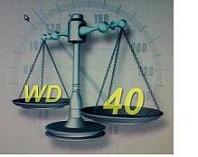Free For The Taking
44 posts
• Page 3 of 5 • 1, 2, 3, 4, 5
-

Duel of Fates - SWBF2 Admin
- Posts: 2812
- Joined: Wed Aug 19, 2009 9:21 pm
- Location: I am here, and there.
- Xfire: virago777
Re: Free For The Taking
Duel of Fates wrote:Taxation without representation? Seems like we have come full circle.
Agreed. Kinda hard to have that when you have 'a bunch of Tards' in Congress.
I was listening on the radio discussing where Gov Perry of Texas and Gov O'Malley of Maryland were debating Perry's thrust to bring businesses and jobs to Texas away from Eastern States like Maryland. One of Perry's comments was "In Texas, we 'pray' for rain...In Maryland, you 'tax' it". And it's true. There's a 'rain tax' in Maryland. One guy got on the phone and said he was taxed $450.00 last year for that rain tax. Seems pretty sad, but I haven't read up on it yet.
-

WD-40 - SWBF2 Admin
- Posts: 4537
- Joined: Mon May 17, 2010 10:12 pm
- Location: Likely on some crappy Hotel internet connection
- Xfire: faststart0777
- [NH]Veritas
- Community Member
- Posts: 216
- Joined: Mon Apr 29, 2013 8:25 pm
- Location: In a computer chair playing SWBF2
Re: Free For The Taking
Yeah, it is true. It's also true that the taxes go specifically to drainage infrastructure, which Maryland needs pretty badly considering the damage of the storm back in June. It's interesting that the guy was taxed 450$ last year, considering that the tax started just a couple of months ago. Regardless, whining about this is like whining about having to pay for levees in New Orleans. It's just more crying about taxes without thinking about why they're there.
99% of soundbites are there just because some two-bit politician thought of a witty remark for once in their lives. Random sentences off the internet have just as much credibility in most cases.
Veritas, i'm glad that you're trying to keep retarded and useless political discussions to the cesspool threads that they're meant for, but it's pointless. Someone's always going to be the one to bring up some completely unrelated political [poo] and then everyone comes in and circlejerks themselves into satisfaction.
99% of soundbites are there just because some two-bit politician thought of a witty remark for once in their lives. Random sentences off the internet have just as much credibility in most cases.
Veritas, i'm glad that you're trying to keep retarded and useless political discussions to the cesspool threads that they're meant for, but it's pointless. Someone's always going to be the one to bring up some completely unrelated political [poo] and then everyone comes in and circlejerks themselves into satisfaction.
-

[m'kay] - MVP
- Posts: 2338
- Joined: Wed Sep 09, 2009 7:52 pm
Re: Free For The Taking
Join a group of people you enjoy playing with. There is no aspect of competition. There is no best clan. And that's not the "real" SS , just yellow lasers recruiting.
[04:25] -SR-Mandalore: who pitches and who catches
[04:29] (SWGO)SWINE*FLU: We'll do it in turns.
[04:30] -SR-Mandalore: That sounds super fair
[04:30] -SR-Mandalore: Do you think other gay couples do that?
[04:30] (SWGO)SWINE*FLU: I reckon so.
COMMANDER OTTO:
and you come with the name Mandalore... really CREATIVE.
BY COMMANDER OTTO
[04:29] (SWGO)SWINE*FLU: We'll do it in turns.
[04:30] -SR-Mandalore: That sounds super fair
[04:30] -SR-Mandalore: Do you think other gay couples do that?
[04:30] (SWGO)SWINE*FLU: I reckon so.
COMMANDER OTTO:
and you come with the name Mandalore... really CREATIVE.
BY COMMANDER OTTO
- Mandalore
- Community Member
- Posts: 852
- Joined: Thu Sep 10, 2009 10:20 am
Re: Free For The Taking
[m'kay] wrote:Yeah, it is true. It's also true that the taxes go specifically to drainage infrastructure, which Maryland needs pretty badly considering the damage of the storm back in June. It's interesting that the guy was taxed 450$ last year, considering that the tax started just a couple of months ago. Regardless, whining about this is like whining about having to pay for levees in New Orleans. It's just more crying about taxes without thinking about why they're there.
99% of soundbites are there just because some two-bit politician thought of a witty remark for once in their lives. Random sentences off the internet have just as much credibility in most cases.
Veritas, i'm glad that you're trying to keep retarded and useless political discussions to the cesspool threads that they're meant for, but it's pointless. Someone's always going to be the one to bring up some completely unrelated political [poo] and then everyone comes in and circlejerks themselves into satisfaction.
[m'kay], you....really do need to change your name to 'Narcissus'.
 I don't believe you are the right guy to lecture others about useless discussions or comments. Maybe the guy said he 'would' be taxed $450.00 this year. I was in traffic, so my direct focus was safely changing lanes. And as I said...It seemed sad because I hadn't read up on it. Besides, Veritas started it by talking about 'rebellion'
I don't believe you are the right guy to lecture others about useless discussions or comments. Maybe the guy said he 'would' be taxed $450.00 this year. I was in traffic, so my direct focus was safely changing lanes. And as I said...It seemed sad because I hadn't read up on it. Besides, Veritas started it by talking about 'rebellion' 
And Yankovic, there are a few clans that seem fine ($$$,NH and others mentioned are good) if you really feel the need to join one. Good luck.
-

WD-40 - SWBF2 Admin
- Posts: 4537
- Joined: Mon May 17, 2010 10:12 pm
- Location: Likely on some crappy Hotel internet connection
- Xfire: faststart0777
Re: Free For The Taking
(=DK=)Samonuh wrote:WD-40, not to go off on a historical tangent, but the colonists were not objecting to an outrageously high tax. In actuality, they were being taxed about 50% less than the citizens living in the British Isles. If anything, the colonists deserved to be taxed even greater due to the fact that a majority of the British' debt was caused by the expenses of the Empire defending the colonies in the French and Indian War. The main problem that the colonists had was that these taxes were passed with no consent or legislative representation in Parliament by the colonists themselves. Prime Minister Grenville essentially countered saying the colonists had "virtual representation," or in other words the colonists' interests were thought about and spoken of by all members of Parliament. This, of course, did not sit too well with the colonists, hence the eventual break-away.
P.S. A lot of other factors contributed to the American Revolution, but this is one of the more important ones...
Samonuh has summarized it excellently. The somewhat comedic end, however, occurred when the colonists themselves established a government (post-Articles of Confederation) and employed "virtual representation" for the people as well: Commoners -> State Legis. -> National Legis. This was only undone with the passage of the 17th Amendment, adopted in 1913 (100 years ago).
Love and Pepsi are the two most important things in life.
-

(SWGO)SirPepsi - Community Member
- Posts: 867
- Joined: Thu Oct 27, 2011 12:53 pm
- Xfire: sirpepsi
Re: Free For The Taking
(SWGO)SirPepsi wrote:(=DK=)Samonuh wrote:WD-40, not to go off on a historical tangent, but the colonists were not objecting to an outrageously high tax. In actuality, they were being taxed about 50% less than the citizens living in the British Isles. If anything, the colonists deserved to be taxed even greater due to the fact that a majority of the British' debt was caused by the expenses of the Empire defending the colonies in the French and Indian War. The main problem that the colonists had was that these taxes were passed with no consent or legislative representation in Parliament by the colonists themselves. Prime Minister Grenville essentially countered saying the colonists had "virtual representation," or in other words the colonists' interests were thought about and spoken of by all members of Parliament. This, of course, did not sit too well with the colonists, hence the eventual break-away.
P.S. A lot of other factors contributed to the American Revolution, but this is one of the more important ones...
Samonuh has summarized it excellently. The somewhat comedic end, however, occurred when the colonists themselves established a government (post-Articles of Confederation) and employed "virtual representation" for the people as well: Commoners -> State Legis. -> National Legis. This was only undone with the passage of the 17th Amendment, adopted in 1913 (100 years ago).
When it really came down to it, the Founding Fathers were just as mistrusting of the common man as was the British Empire, hence our Electoral College system. The only way to really justify the colonists' split was the cultural disconnect which had slowly been established over a century and a half of Atlantic separation. Once fourth/fifth generation American colonists were being born, their norms had become practically foreign to those of England.
...انا أتكلم اللغة العربية. هل هي سيئة؟ لا
-

(=DK=)Samonuh - Community Member
- Posts: 734
- Joined: Sun Aug 14, 2011 5:20 am
Re: Free For The Taking
(=DK=)Samonuh wrote:When it really came down to it, the Founding Fathers were just as mistrusting of the common man as was the British Empire, hence our Electoral College system. The only way to really justify the colonists' split was the cultural disconnect which had slowly been established over a century and a half of Atlantic separation. Once fourth/fifth generation American colonists were being born, their norms had become practically foreign to those of England.
Again, agreed. Going off on a tangent here, the individual liberties that distinguished the US from Britain were added primarily out of fear for centralized government, and were prerequisites to the unanimous ratification of the Constitution. They were not, contrary to popular belief, attached because the founding fathers cherished freedom and tolerance, but rather because they felt without granting these rights to their citizens, their yet-to-be-established government would be unable to keep the "nation" together.
Love and Pepsi are the two most important things in life.
-

(SWGO)SirPepsi - Community Member
- Posts: 867
- Joined: Thu Oct 27, 2011 12:53 pm
- Xfire: sirpepsi
Re: Free For The Taking
(SWGO)SirPepsi wrote:
Again, agreed. Going off on a tangent here, the individual liberties that distinguished the US from Britain were added primarily out of fear for centralized government, and were prerequisites to the unanimous ratification of the Constitution. They were not, contrary to popular belief, attached because the founding fathers cherished freedom and tolerance, but rather because they felt without granting these rights to their citizens, their yet-to-be-established government would be unable to keep the "nation" together.
Sad to see our education system producing this kind of "thinking".

-

Duel of Fates - SWBF2 Admin
- Posts: 2812
- Joined: Wed Aug 19, 2009 9:21 pm
- Location: I am here, and there.
- Xfire: virago777
44 posts
• Page 3 of 5 • 1, 2, 3, 4, 5
Return to Star Wars Battlefront II
Who is online
Users browsing this forum: No registered users and 6 guests

